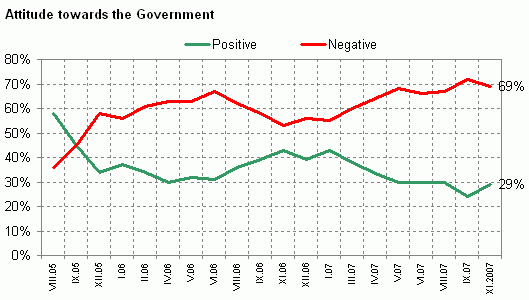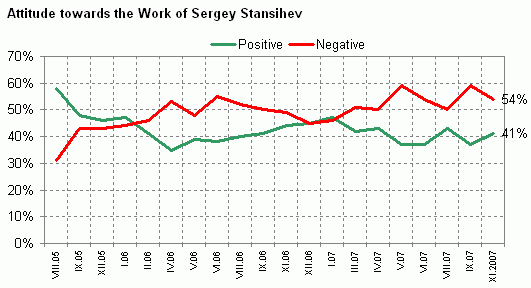
Considerable Electoral Advantage for GERB after the Municipal Vote:
Genoveva Petrova
Alpha Research’s monitoring of the public opinion on political and social issues conducted between the 12th and the 17th of November 2007 outlines the following trends:
• considerable electoral advantage for GERB after the municipal elections
• continuous mistrust in the government
• polarized public attitude regarding the possibility for eventual pre-term elections
Two key trends have been established as a result of the past municipal elections: BSP gained the best positions in the local government, while GERB formed the largest electoral base. BSP found reasons to boost its self-confidence in the extent of its local representation. However, from the point of view of its influence on a national scale a continuous mistrust towards the socialist-dominant government is observed.
The electoral attitudes of the voters show that in the weeks immediately after the local elections GERB receives a distinctly larger support than BSP. 26% of the people of age in the country state they would vote for the party of the capital’s mayor if the parliamentary elections were today. Because of the general electoral uplift, the support for GERB is extremely heterogeneous. Voters from diverse socio-economic status declare readiness to vote for the party. To a large extent the people relocating their support to the “new favorite” are voters from the big cities, as well as those who have previously supported its competitors in the municipal elections: one third of them have voted for regional and/or business formations, 25% for UDF or DSB, and a fifth for NMSS.
In November, BSP electoral potential accounts for 18% of the total number of voters. The socialists keep their positions mainly in the smaller towns and among the groups traditionally supporting them: the older generations, retirees, and people with a lower socio-economic status. However, these groups are precisely the ones who are the most vulnerable to the unfavorable economic trends and are the main source for discontent towards the social policy of the government. The direct consequence of this discontent is the decrease in the electoral support for BSP.
The unified participation of the right-wing parties in many municipalities in the country did not bring the expected return of public trust in them. The representation of UDF and DSB in the local government is very restricted – both in terms of number of seats and in terms of municipalities, in which they managed to gain seats. Currently, their electoral potential on a national scale does not exceed the minimum of 1.9% of the total number of voters for UDF and 1.6% for DSB. Their support equals that of VMRO (1.4%). Contrary to UDF and DSB, tough, VMRO’s base has become more stable over the past few months, and the public trust in the party and in its leader slowly but steadily rises.
NMSS also experiences a strong electoral decay. The yellow party lost representation in a number of municipalities. The majority of its seats in the municipal councils are not a result of their independent participation but rather of a coalition with other parties. The monitoring of the public opinion shows that a readiness to vote for NMSS have only 1.9% of the voters who are predominantly old people from the big cities.
Ataka ended the election with a contracted electoral potential too. The nationalists managed to win about 5% of the seats, but they are focused in about one third of the municipalities.
Contrary to them, MRF once again managed to expand its presence in the local government. The Movement expanded its number of seats with about 30% (a level of increase below the one expected by the party leader Dogan 50%), as well as the share of municipalities in which it is represented. On a national scale though, we can speak neither of an increase of the public trust towards the party or its leader, nor about an increase of its electoral base. In November, as well as before the elections, MRF has been supported by 7% of the total number of voters in the country.
The mobilization from the local elections partially managed to restore the loosen trust in the government by the teachers’ strike. In September its level of trust fell down to 24% but in November went up again to 29%. Despite the good positions BSP and MRF won in the local government the evaluation of the work of the government continues to be strongly negative (69%). As well as it was before the elections the spheres the most severely criticized are the social policies, healthcare, state policies for disasters and accidents, agriculture and interior affairs.
At the same time, the public opinion regarding eventual pre-term elections in the spring of 2008 is strongly polarized. Currently, people are more inclined to see a correction of the policies of those in power and let them finish their terms. Boiko Borissov’s call for elections in the next few months is favored by 20% of the voters, mainly supporters of GERB and Ataka.
.gif)



